 How do you get legally married in Italy for a destination wedding?
How do you get legally married in Italy for a destination wedding?
The ultimate guide to what is a destination wedding

Scroll through your socials and you’d be forgiven for thinking that everyone is getting married in some exotic city overseas. Destination weddings are on the rise in 2025, with more couples ditching the traditional hometown ceremony in favour of a passport stamp. This begs the question: what actually determines a destination wedding, and how does it all work?
This guide breaks down everything you need to know: what defines a destination wedding, how they work, who pays for what, and whether it’s the right move for your big day.
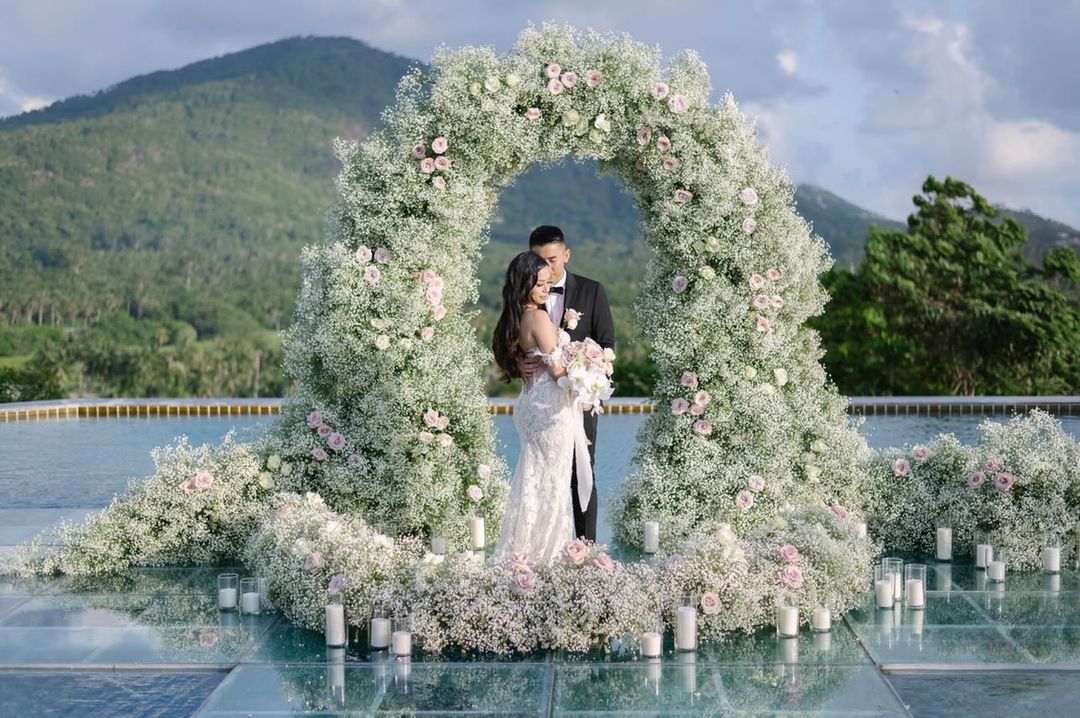
The definition of a destination wedding
The traditional definition of a destination wedding is pretty straightforward: it’s a wedding held in a location away from the couple’s hometown.
But what counts as “away” is where it gets interesting.
Some say a destination wedding means getting married overseas. Others argue it includes any wedding that requires most guests to travel, whether it’s interstate, to a regional location, or even just far enough away that everyone needs overnight accommodation.
A modern definition of a destination wedding meaning
A destination wedding is one that takes place away from the couple’s usual place of residence, but not every wedding that involves travel qualifies. The defining factor isn’t just geography: it’s intention.
While traditional definitions point to “a wedding held out of town,” the modern take goes deeper. A destination wedding is typically held in a location chosen for its setting, not its sentimental ties. It’s about intentionally picking a place that offers something different, whether that’s tropical weather, breathtaking views, or the chance to turn your celebration into an immersive experience for everyone involved.
Crucially, it’s not your hometown. It’s not your partner’s hometown. And it’s not your childhood holiday house. Even if it requires travel, getting married in a place with deep personal history often feels more like a local or semi-local wedding than a destination one.
So, what defines a destination wedding?
- It requires travel (often with overnight stays) for the couple and most guests
- The location is selected for itself: its beauty, atmosphere, or uniqueness; not just because it’s home
- It usually spans multiple days and includes events beyond the ceremony (welcome drinks, recovery brunches, excursions)
- It blends the wedding with a getaway-like experience for everyone attending
Think of it this way: a destination wedding turns your “big day” into a shared adventure. It’s about creating memories somewhere meaningful, even if that meaning is entirely new.
Oh, and just to clear it up: getting married in your hometown church and calling it a destination because your friends have to drive an hour? Cute. But no.
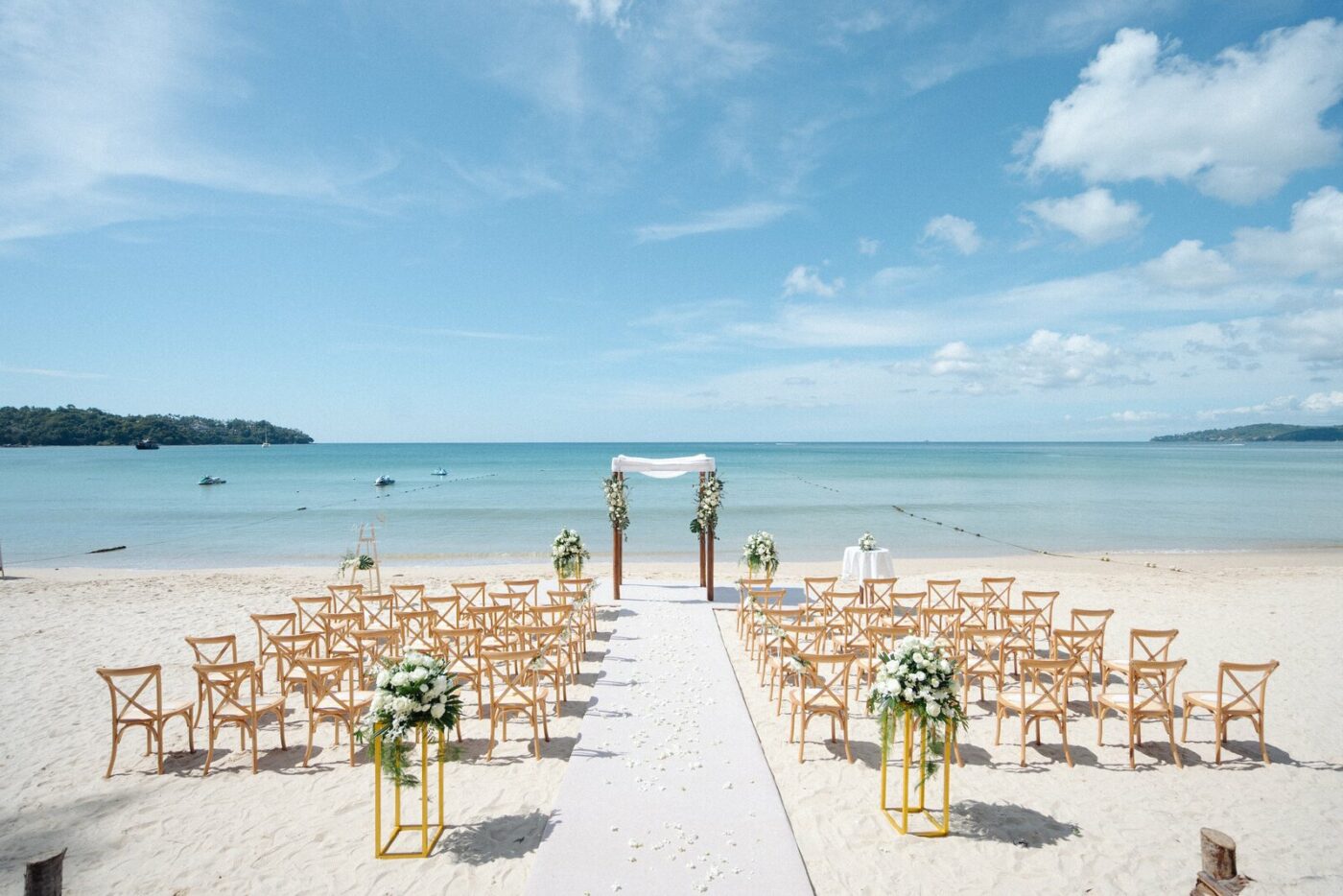
Venue // Arinara Beach Resort Phuket
How do destination weddings work?
Planning a destination wedding is a little different to hosting one in your hometown – but that’s part of the charm. It’s less “ceremony and done” and more of a full-blown experience for you and your guests. Think of it like planning a mini holiday… with a wedding in the middle.
Here’s the basic structure:
1. Choose your destination
Pick a location that fits your vision, budget, and guest vibe: whether that’s a beach in Bali, a winery in regional Australia, or a cliffside villa in Italy. Some couples choose a spot they’ve always wanted to visit. Others pick a place they’ve fallen in love with before.
2. Book a venue (and maybe a planner)
Many destination wedding venues offer packages or have in-house planners to help coordinate things from afar. Some couples also hire a local or travel-savvy planner to handle logistics, suppliers, and timelines.
3. Send save-the-dates early
Because travel is involved, guests need as much notice as possible (ideally 9 to 12 months). That gives them time to sort flights, passports, time off work, and babysitters.
4. Plan a multi-day celebration
Destination weddings are rarely just one event. Most include:
- Welcome drinks or dinner the night guests arrive
- The ceremony and reception on day two or three
- A recovery brunch, beach day, or farewell event to wrap it all up
You don’t need to plan every minute, but giving guests a general itinerary helps them make the most of their stay.
5. Consider group travel and accommodation
While guests usually pay for their own flights and rooms, many couples reserve hotel blocks or suggest nearby villas to make things easier (and sometimes cheaper) for everyone.
6. Sort the legal stuff
In some countries, it’s easier to do the legal paperwork at home and hold a symbolic ceremony abroad. Others allow you to get legally married on the day, but might require residency, translations, or local officiants. A wedding planner or celebrant can help you figure this out.
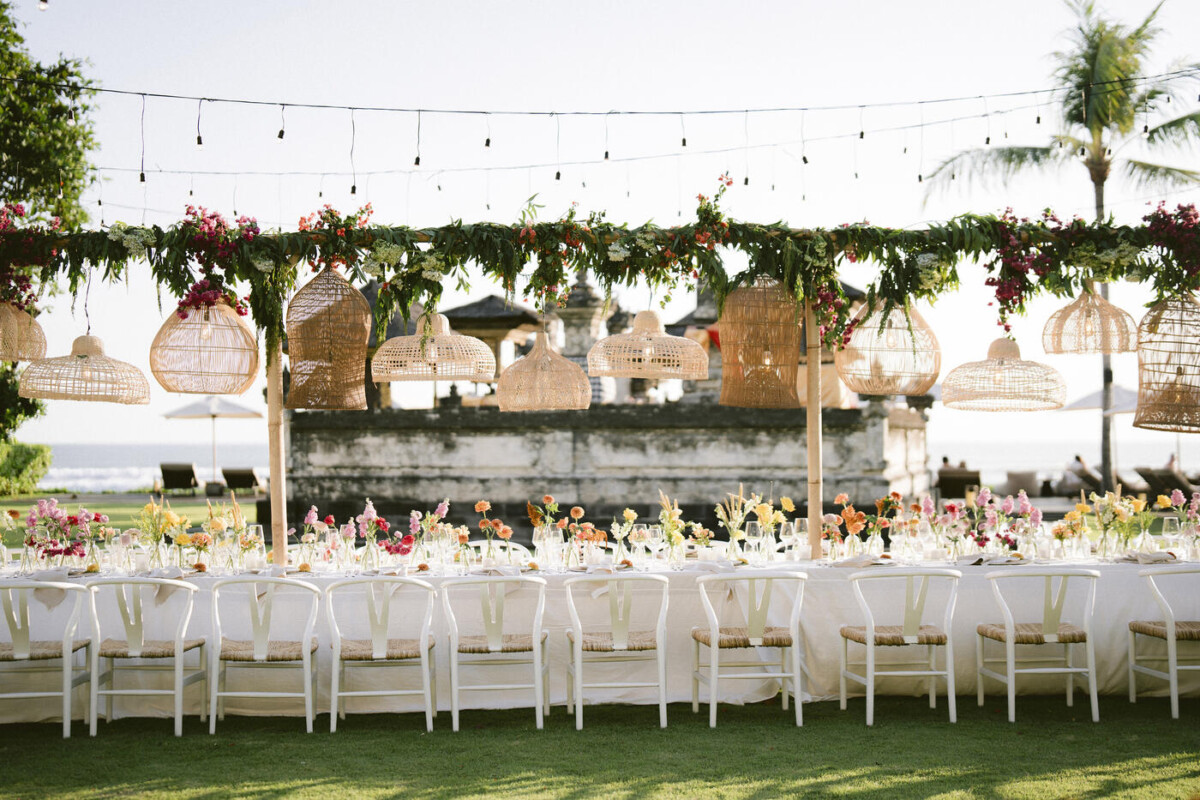
Venue // Alila Seminyak
Why do people have destination weddings?
Because who wouldn’t want to turn their wedding into a multi-day holiday with their favourite people, in a place that looks great on Instagram and comes with built-in excuses to trim the guest list? Destination weddings are part party, part vacation, part “sorry Aunty Carol, we had to keep it small.”
Truth be told, destination weddings are popular because they offer more than just a ceremony: they create an experience. Couples love the idea of spending quality time with their closest friends and family over a few days, rather than rushing through a single afternoon.
And with smaller guest lists and a more relaxed atmosphere, destination weddings often lean into the microwedding vibe, making the celebration feel more personal.
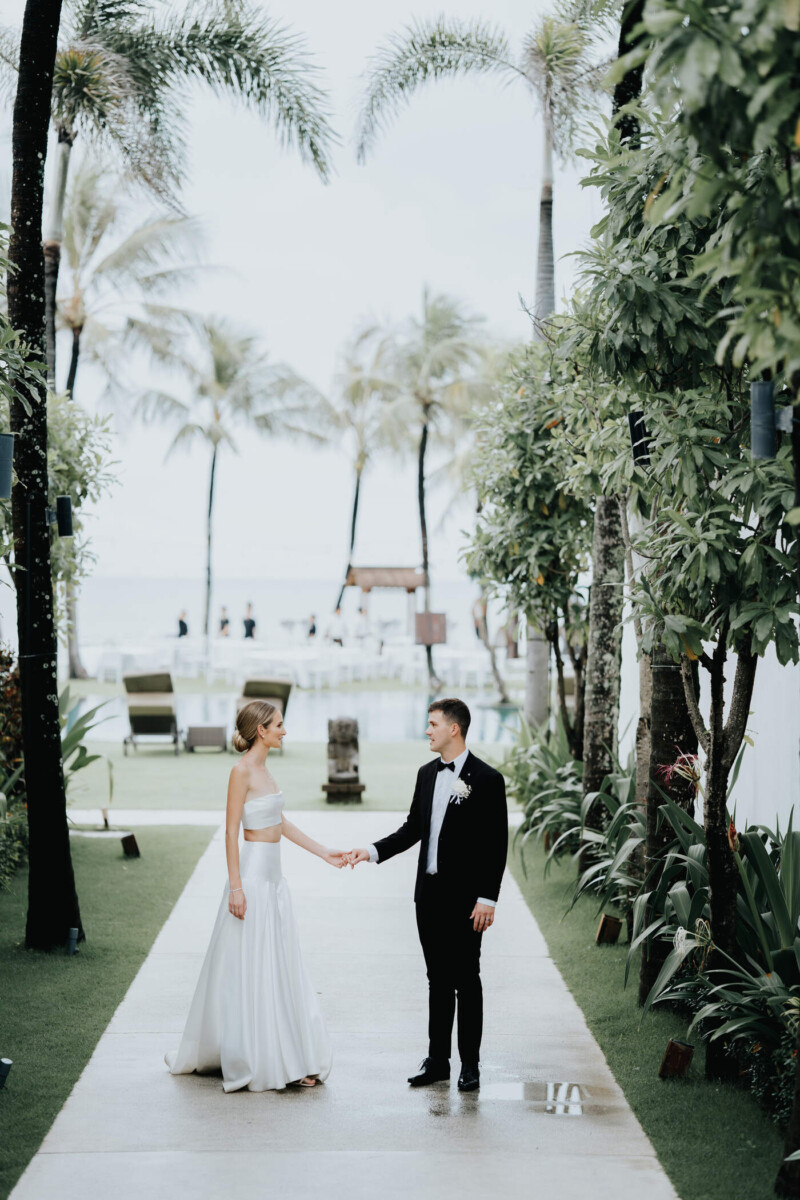
Venue // The Samaya Seminyak
Pros & cons of destination weddings
Before you start browsing villas in Tuscany or Googling “how to say ‘I do’ in Thai,” let’s break down the real perks and potential pitfalls of planning a destination wedding.
Pros
More quality time with guests
Unlike a traditional wedding where you might get five minutes with each person, destination weddings often stretch across several days—hello welcome drinks, recovery brunch, beach hangs—which means more actual connection.
Intimate guest list
Fewer RSVPs = less stress. Destination weddings are a great (and polite) way to keep things small without offending anyone. People get it—it’s a big trip.
Built-in honeymoon
You’re already somewhere beautiful, so why not roll straight into your honeymoon? No airport dash required.
Unique setting = unforgettable photos
Let’s be honest—your wedding album is going to pop. Whether it’s a mountaintop, vineyard, or seaside ceremony, the backdrop alone sets the tone.
Less pressure to please everyone
With a smaller crowd and more chill vibe, couples often say they feel freer to do things their way—ditch the formalities, wear what you want, and skip the traditions that don’t speak to you.
Cons
Not everyone will be able to come
Whether it’s finances, work, kids, or health, some guests won’t make it—and that can be hard, especially with close family or friends.
More planning logistics
Time zones, language barriers, legal paperwork, group bookings… it’s a lot. Hiring a planner or choosing a venue with solid coordination support is a must.
Costs can sneak up
While the guest list may be smaller, hosting multiple events, paying for key people, or choosing a luxe location can add up fast. It’s not always the cheaper option.
Less flexibility on last-minute changes
Can’t just “pop over” to the venue the week before to check the table settings. Once you’re in, you’re in—so research and prep are key.
You may need a Plan B
Outdoor wedding in a tropical climate? Gorgeous, but unpredictable. Weather, flight delays, and global events can impact your plans more than a local wedding.

Venue Devasom Khao Lak Beach Resort // Captured by Madiow Photography
Are destination weddings cheaper or more expensive?
Destination weddings can be cheaper if you’re hosting a smaller group in a country where vendor costs are lower or packages are all-inclusive. Fewer guests usually means lower catering costs, fewer tables to decorate, and less pressure to invite every second cousin.
But they can also get pricey fast. Flights, accommodation, multiple events, transport, legal fees (if marrying overseas), and currency exchange can add up, especially if you’re covering part of the cost for your family or your wedding party.
This brings us to our next point…
Who pays for what at a destination wedding?
Ah yes: the million-dollar question (literally, for some).
Let’s clear this up: you are not expected to pay for your guests to attend your destination wedding. Unless you’ve offered, or happen to have an unlimited budget, no one should expect you to cover flights and accommodation.
Think of it this way: if you were getting married at home, would you be paying for everyone’s Uber and hotel? Probably not. A destination wedding is still an invitation, not a demand. Guests choose whether to attend, and part of that choice involves covering their own travel costs.
That said, if there are certain VIPs you can’t imagine your day without – like your grandparents or best friend on a student budget – it’s totally okay to help out or adjust your plans. Consider choosing a more affordable location, an off-peak date, or giving your guests as much notice as possible (we’re talking 9–12 months) so they can budget and book early.
Bottom line: you’re not being selfish. Just be upfront, give people time, and do what you can to make it easy for those you love most.
What about gifts?
We hear you: “If I’m paying to travel, do I still have to give a gift?”
Short answer: technically yes… but there’s nuance. Most couples don’t expect lavish gifts from guests who’ve already shelled out for flights, hotels, and days off work. Your presence really is the present.
That said, wedding gifts are still customary, even for destination weddings. Many couples opt for a honeymoon fund or virtual registry instead of traditional gifts (because no one wants to haul a toaster back from Tulum). If you do plan to give something, send it before or after the wedding, not in your suitcase.
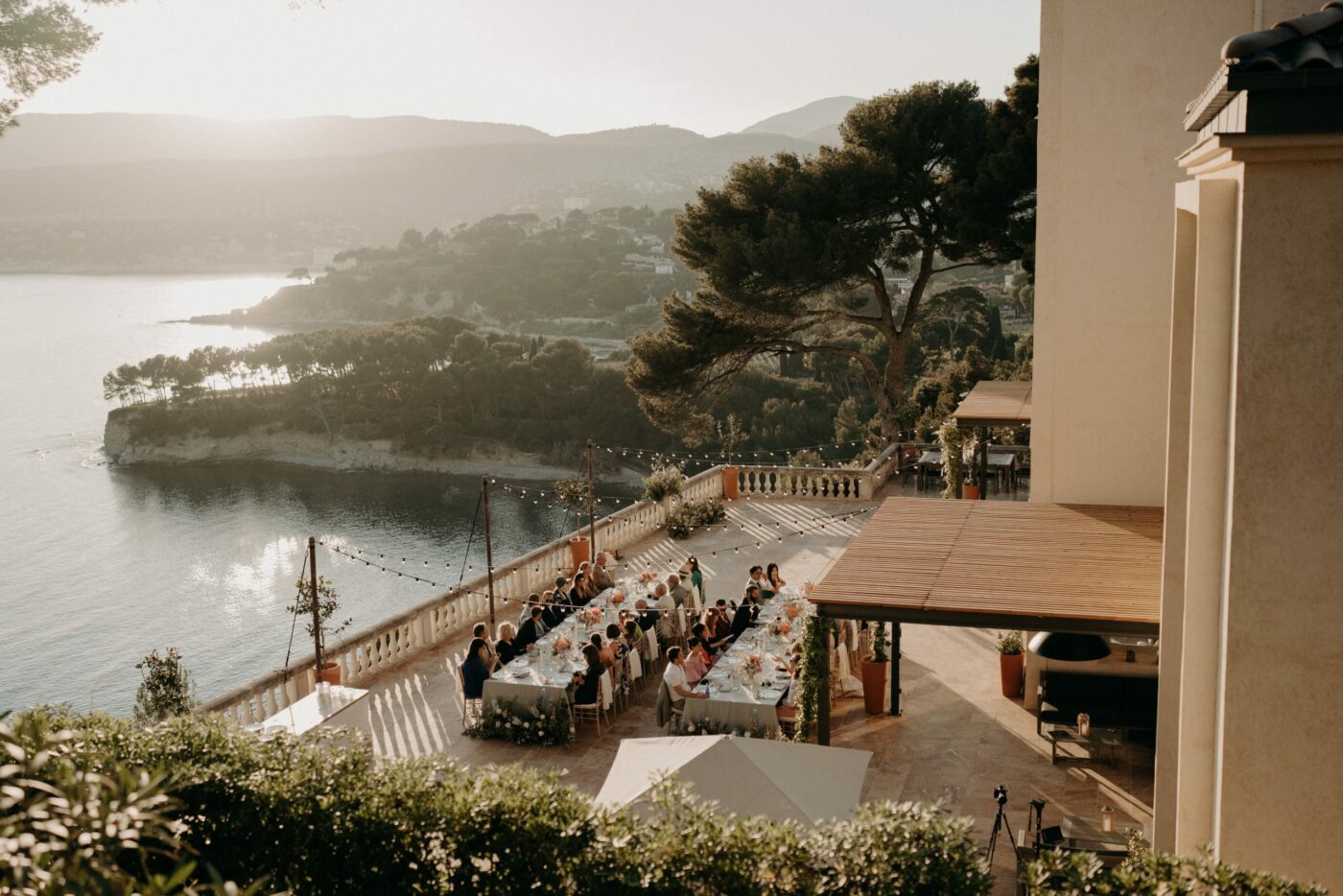
Venue // Domaine de Canaille
What places are best for a destination wedding?
The best destination wedding location? That all comes down to your vibe, your budget, and how far you’re willing to go (literally and figuratively). Here are some popular picks, based on the kind of wedding experience you’re after:
Tropical paradise vibes
If your ideal wedding look involves bare feet in the sand, cocktails in coconuts, and sunset photos that need no filter, a tropical destination might be your match.
- Fiji: Private island resorts, warm hospitality, and packages that make planning a breeze. Bonus: it’s relatively close for Aussie couples.
- Bali: Luxe for less, stunning villas, and a mix of culture, spirituality, and beachfront bliss.
- Maldives: The ultimate in barefoot luxury—overwater villas, turquoise lagoons, and intimate, high-end celebrations.
- Thailand: Beautiful beaches (hello, Phuket and Krabi), great food, and excellent value for money. You can go big here without blowing the budget.
Romantic European charm
Old-world elegance meets cinematic backdrops. Think stone villas, vineyard receptions, and slow, soulful celebrations.
- Italy: Whether it’s a Tuscan villa, a cliffside Amalfi view, or a lakeside elopement at Lake Como, Italy is all about beauty, food, and passion.
- Greece: Whitewashed buildings, deep blue seas, and dreamy island escapes like Santorini and Mykonos make Greece a go-to for modern romantics.
- France: The south of France offers rustic charm and lavender fields, while Paris delivers chic city elopements and grand chateau weddings with serious style.
Adventure + drama
For couples who’d rather hike than hotel hop, these destinations are all about drama—mountain views, epic landscapes, and unforgettable moments.
- Queenstown, New Zealand: Snow-capped peaks, lake views, and the option to heli-drop into your ceremony? Yes, please.
- Iceland: Waterfalls, glaciers, black sand beaches. Ideal for elopements or small weddings that feel like a real-life fairytale.
- South Africa: Safari lodges, vineyard valleys, and dramatic coastlines—plus, your honeymoon can start the next morning with a game drive.
Other honourable mentions
- Japan: For couples who want culture, ceremony, and cherry blossoms (or snow).
- Mexico: Incredible food, vibrant energy, and all-inclusive options that make logistics simple.
- Scotland: Misty moors, castles, and whisky-fuelled celebrations for those with a love of heritage and history

Venue // Outrigger Fiji Beach Resort
Should you have a destination wedding?
At the end of the day, a destination wedding isn’t just about a picturesque backdrop or ticking off a travel bucket list: it’s about choosing to celebrate your love in a way that feels intentional, memorable, and totally you.
They’re not for everyone – and that’s okay. But if the idea of turning your wedding into a mini-holiday sounds more exciting than a traditional hometown affair, then it might just be the perfect fit.
Ready to turn your dream into a destination?
Explore our curated wedding destination wedding packages in Fiji, Bali, and Thailand, and access exclusive offers from our global partners. Your perfect “I do” is only a flight away.
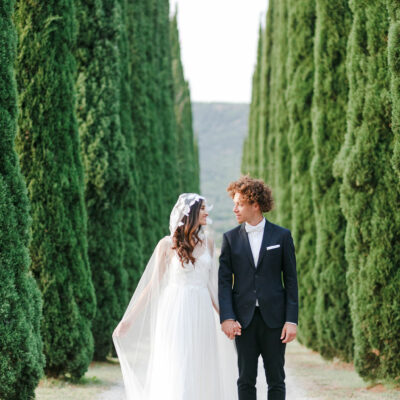 What part of Italy is best for a destination wedding?
What part of Italy is best for a destination wedding? 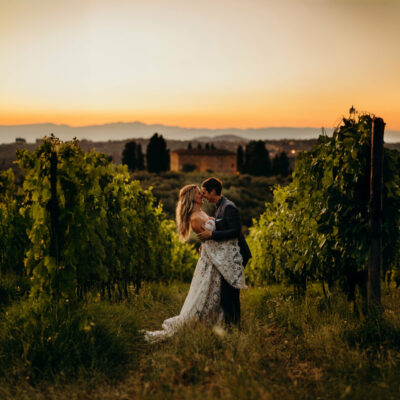 What’s the best time of year for an Italy wedding?
What’s the best time of year for an Italy wedding?